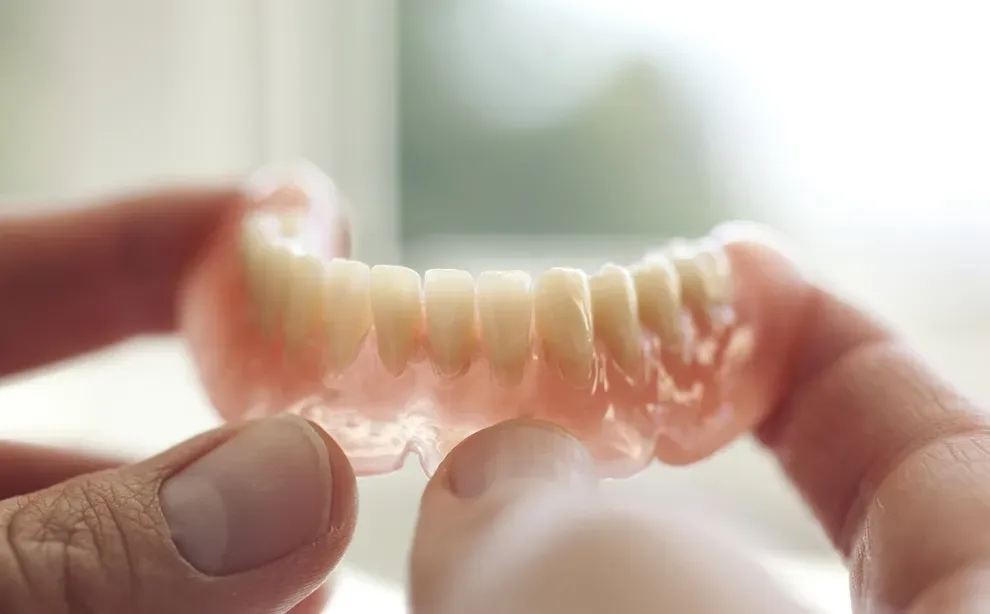Cost of Dentures With & Without Insurance

Table of Contents
- Cost of Dentures
- Types of Dentures
- Denture Cost Factors
- Cost with Insurance
How much do dentures cost? It depends. Factors like the type of denture you need and what your dentures are made of have a deep impact on your total price tag. This table can help you understand the differences at a glance:
Traditional dentures usually cost between $1,000 to $3,000 per arch without insurance. Partial dentures may average around $1,400 to $1,800 for a set.
The cost of dentures varies greatly depending on factors that include the materials the dentures are made from, how they are made, and which other procedures are involved, such as tooth extraction or dental implants.
Type of Denture | Average Cost | Key Features | Typical Life Span |
Traditional | $1,000-$15,000 | Removable dentures that fit over your gums | 10 years |
Immediate | $600-$1,000 | Temporary dentures you wear while permanent versions are made | Not meant to last |
Partial | $500-$2,500 | Replace just a few missing teeth and snap on with metal bits that loop over remaining teeth | 5 years or more |
Implant Supported | $3,000-$6,000 per implant + cost of dentures | Removable like traditional dentures, but more stable as they snap onto implants | Depends on the denture type attached to the implants |
Dental insurance may help with the cost of dentures, paying or reimbursing you for a percentage of the price of the dentures and/or dental procedures involved.
How Much Do Dentures Cost?
The cost of dentures depends on a number of factors, but generally, there are three four price range options for dentures:
Low-cost dentures: A complete set of low-cost dentures may cost as little as $600. The material used in these cheaper dentures may be of a lesser quality, and they may be cold-cured. In some cases, the look may be less pleasing than costlier options.
Mid-cost dentures: Many people who get dentures will go with a mid-cost option, usually with a price tag of around $1,800 for a full set. Most dentures in this price range are heat-cured and offer a more natural look.
Premium dentures: High-end dentures, which can cost more than $8,000 for a set, are highly customized and crafted from the finest materials for a very natural look and feel.
Implant-supported dentures: The cost of surgery and in-office procedures make implant-supported dentures the most expensive option, especially without insurance. Some online estimates range from $8,000 to $20,000.
Types of Dentures
Dentures are prosthetic teeth that are custom fit to your mouth and bite. The different types of dentures include the following:
Also called complete dentures, full dentures are for those with no remaining teeth. Prosthetic replacement teeth fit into a base (made from acrylic) that’s designed to match your gums.
Pros: For those without natural teeth, dentures often offer the most affordable and easiest option for regaining their day-to-day abilities and quality of life. Plus, today’s advanced dental technology means there are more denture options available than ever before, and many offer extreme comfort and convenience.
Cons: Dentures can take time to get used to, and they can affect eating and speaking. Some foods, like sticky or chewy choices, will have to be avoided. Dentures can also slip out (although they shouldn’t if fitted properly) and require regular maintenance like cleaning and soaking.
Removable partial dentures are used when some natural teeth are present, but others are missing. A removable device with the replacement teeth attached and a gum-matching base fit into the mouth, usually with a metal framework base.
Pros: Many removable partial dentures are comfortable and blend well into the mouth, offering an affordable fix for missing teeth. Replacing missing teeth is important for oral health. Dentures will ensure teeth don’t shift out of place because of the gaps caused by missing teeth.
Cons: Some people don’t like the look or feel of a metal frame base. Like full dentures, partial dentures may feel uncomfortable or unnatural at first, and they can limit your food choices.
Fixed partial dentures (bridges) replace missing teeth by placing dental crowns on both sides of the lost tooth or teeth and then attaching the prosthetic tooth or teeth to the crowns.
Pros: Bridges reduce the risk of decay or teeth shifting due to the space caused by a missing tooth. They also will make sure a missing tooth doesn’t later affect eating or speaking.
Cons: Bridges can be expensive, as they require two crowns in addition to replacement teeth. If there are severe oral health problems, such as decay or gum disease, the mouth may not be able to support a bridge.
Immediate dentures are placed in the mouth right after a tooth extraction and worn while permanent dentures are being created. Unlike permanent dentures, immediate dentures aren’t custom fit to your mouth and bite. They are only a temporary solution after the removal of teeth.
Pros: Immediate dentures allow for an immediate fix after tooth extraction, so there’s no period of time with no teeth (and no embarrassment leaving the dentist’s office).
Cons: Because they’re not customized, immediate dentures may slip and feel unnatural. They aren’t as sharp as permanent dentures, so it can be difficult to eat with them. Immediate dentures are also an additional cost when getting dentures and may not be covered by insurance.
Fixed dentures, also called fixed implant-supported dentures, are attached to dental implants that are placed in the jawbone. They aren’t removable, although a dentist can remove them if needed.
Pros: Dental implants provide strength and structure to the jaw and the mouth. They don’t slip or wobble, and they feel more natural and secure in the mouth.
Cons: Because of the implants, fixed dentures may require a lengthy preparation progress and surgery. They are also more expensive than other dentures.
While they don’t require soaking like dentures, implant-supported dentures may complicate oral care because the areas between the teeth and the hardware can accumulate bacteria and food particles. These areas should be cleaned daily with interdental brushes or other flossing tools.
Factors That Affect Denture Cost
How many teeth you are replacing with dentures will be a major consideration in the price of your dentures. Other factors may include the following:
Oral exams: A dental visit to assess your suitability for dentures can cost $50 to $350. If you need x-rays in this appointment, they can cost $20 to $250.
Tooth removal: If your dentist needs to take out teeth before placing dentures, you can expect fees between $75 and $650 per tooth. Those fees typically include the anesthesia and surgical materials needed to take out your teeth.
Tissue liners: Some people need a soft lining inserted between the gums and the dentures. Most dentists don’t charge for this service, but some do.
Dentist location: Dental services and dentures are more expensive in some geographical regions than in others.
Denture material: Dentures made with porcelain will be more expensive than acrylic. Opting for an acrylic base over a metal frame may also add to the cost.
Other procedures: If additional teeth extractions or fillings in other teeth are needed, this can increase out-of-pocket costs.
Repairs. If your plates crack or break, expect to pay $50 to 200. If your dentures no longer fit after you drop or harm them, relining can cost $250 to $450.
Some costs are typically included in the denture fee. For example, you may not have to pay fees for diagnostic casts or your first fitting appointment.
Cost of Dentures with Insurance
Many dental insurance plans will cover some of the cost for dentures. How much you’ll save will depend on your policy and benefits.
Typical insurance plans you might use to pay for dentures include the following:
Dental insurance: Companies like Humana offer coverage for visits you need for a proper fit and discounts to help you pay for dentures. While it’s difficult to make sweeping statements (dental plans can vary widely), most plans require you meet a deductible, and once you do, you’d get 100% coverage for preventive care (like cleanings), 80% coverage for basic procedures (like fillings) and 50% coverage for major procedures (like dentures).
Medicaid: Medicaid plans are run by the states, and coverage for dentures can vary widely. In Alabama, Medicaid won’t cover dental services at all. In North Carolina, the benefits are extensive and cover both periodontal care and dentures at nearly 100%.
Medicare Supplemental: Standard Medicare plans rarely (if ever) cover dental services. However, if you have a Medicare supplemental plan (like Medicare Advantage), you might get help with dental bills. Those plans often look a lot like the dental insurance plans we’ve discussed above.
Speak to your plan provider to get a clear understanding of their coverage and your potential fees.
